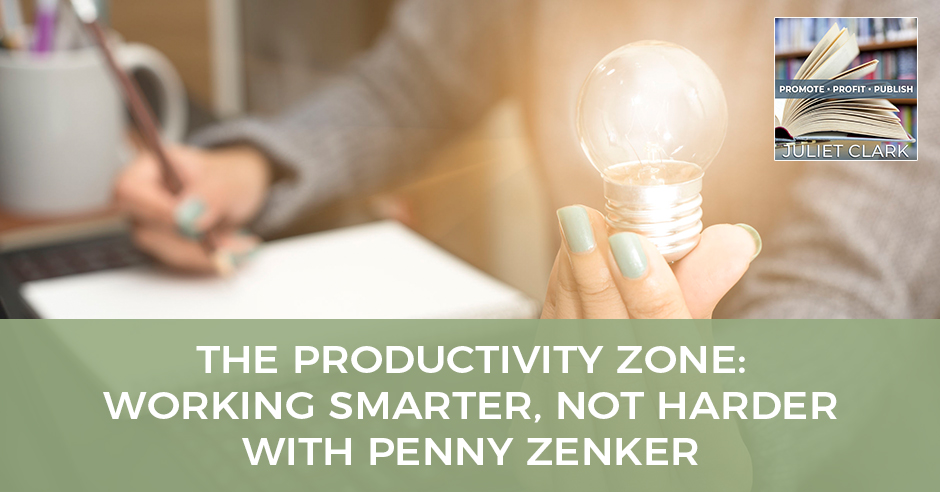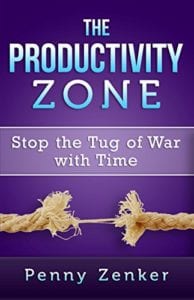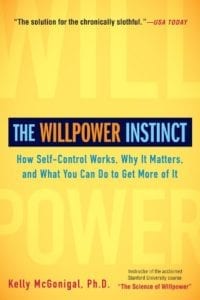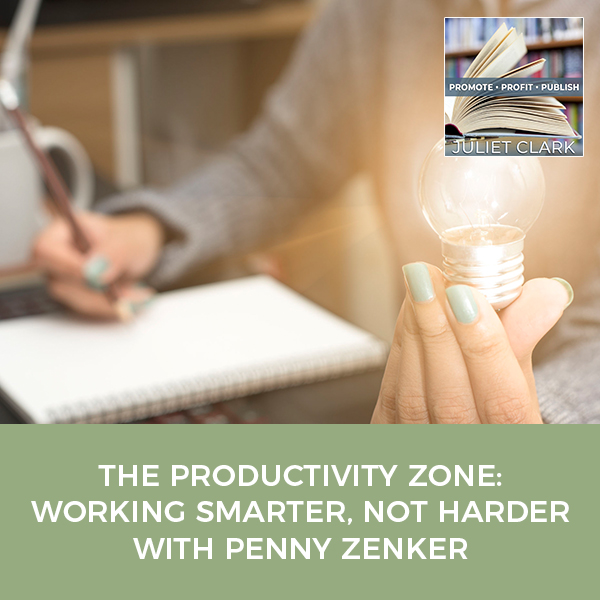
A big percent of the population gets caught up in the minutia. We’re not being purposeful or conscious of all the choices that we’re making so that we can be productive. Penny Zenker says being in the productivity zone doesn’t just mean doing more. It means working smarter, not harder. Penny is an international speaker, business strategy coach, and bestselling author. She is one of America’s leading experts in the psychology of productivity to eliminate distraction, perfectionism, and self-sabotage to maximize results in every area of your life. Penny gets deep into the subject of productivity and how she helps people to think and act more strategically.
—
Watch the episode here:
Listen to the podcast here:
The Productivity Zone: Working Smarter, Not Harder with Penny Zenker
Our guest is someone I’ve had on here before, but it’s that time of the year again when we have to start thinking about what we are going to do for 2019. Penny Zenker is an international speaker, a business strategy coach and a bestselling author. Before her 31st birthday, she founded, developed and sold her first multimillion-dollar business. Later she managed business unit turnarounds and was a Tony Robbins business coach. Penny is one of America’s leading experts in the psychology of productivity to eliminate distraction, perfectionism and self-sabotage to maximize results in every area of your life.

The Productivity Zone: Stop the Tug of War with Time
Over the past two decades, she has coached thousands of entrepreneurs, executives and business leaders to do the same. Penny’s book, which we’re going to talk a little bit about, The Productivity Zone, was an instant Amazon bestseller and her TEDx, The Energy of Thought has gained attention around the world. Her engaging, inspiring, interactive talks, teach people to think and act more strategically. Penny has also been featured beside here on NBC News, Forbes, Inc., ESPN and the Wharton Business Radio among others. Welcome, Penny.
Thank you.
I have to ask. Why ESPN?
It was actually a fishing show and they wanted to talk about how they could have more time to fish. They make all these plans like we all do to make these great vacations and they never come to fruition. They asked me to be on the show to talk about how to help people be more productive in their lives so they can fish more. That was my ESPN debut.
I thought that perhaps you were able to allow them to get more fish when they go out, but apparently no.
I don’t do that but by helping them to think and act more strategically on the other part of their life, they can make more time and make more room for the things that they absolutely love to do.
For a lot of these people, they probably have never heard of a productivity mentor. What exactly do you do?
It exactly it depends on the person but I think the gist of it is that I help people to think and act more strategically. What that means exactly is that 98% of the population gets caught up in the minutia, in the detail in the busy. We’re not conscious of all the choices that we’re making and being purposeful so that we can be productive. Productive doesn’t just mean doing more. It means that age-old saying, “Working smarter not harder.” For those fishing people, it’s taking a look at where are they getting stuck, where are they wasting time, what is more strategic for them to focus on? Strategic focus so that they have more time to do the things that are most important to them. For an entrepreneur for instance, it might give them more time in the sales arena because they are spending way too much time on things that don’t grow their business and don’t really matter at the end of the day. For each individual, depending on where they’re coming from, it might be shifting their focus wherever it might be based on their goal set.
I know relating that back to the business I’m in, a lot of people will spend their time developing content versus doing the things that will monetize them. That’s huge for you to be able to get them out of that zone and doing the things. A lot of people hate sales so they’ll do anything to avoid it but it’s a necessity for us as entrepreneurs.
Life is not meant to be perfect, but it's meant to be moving forward and growing all the time personally and professionally. Share on XI don’t know why they hate sales, that’s what our businesses are. We’re supposed to make a profit. You go in and ask somebody, “What are you in business for?” They can come up with all these things, but that’s all great. That’s one of the things that we need to make a profit in our business for it to pay us our salaries and pay other people their bills and then to add value. If we’re not making a profit, we’re not adding value in the marketplace because we can’t do any research and development. We can’t innovate. There are so many things that we can’t do for our customer if we’re not a healthy profitable company.
I might add, if you’re not a profitable company, you might not be a company. You said that the people are all over the place and this, “Everybody’s different.” What would a typical productive entrepreneur look like?
It is a very difficult question to answer because it starts with what is the entrepreneur’s goal? Where they are going to focus on is going to depend on what their goal is. Somebody might be looking to create a completely online business so that it’s complete residual income. Somebody else might want to build a product so that they can then sell their business at a later time, whereas someone else might want a lifestyle business. It starts with understanding first what their goal is for their business. I know that seems obvious, but a lot of people don’t spend the time to identify what they want this business to be. If you don’t, if you ever think you might want to sell your business, there are so many things you need to do in the beginning in order to set yourself up for success there. If you don’t, it’s a lot harder, it takes longer and it’s more painful to do it later.
It’s a good idea to think of that first and it goes back to the productive entrepreneur is the entrepreneur that knows that they’re not a lone wolf. They can’t do everything themselves. They set themselves up with a fantastic team, whether it’s outsourced or whether it’s insourced. That all decision-making depends on a number of different things. They put processes in place to automate where possible. They are proactively looking at that. They’re also focusing their time on what grows the business and moves the business forward and then they delegate everything else. That’s what a successful, productive entrepreneur looks like. You can call it productive and successful, a little bit synonymous. When you’re productive, then what I call it is efficient and effective and that means that you’re successful. You’ve got some balance in your life and at the same time, you’re making money and everything is good. It’s not perfect because it’s not meant to be perfect, but it’s meant to be moving forward and growing all the time personally and professionally.
You and I are both CEO Space members. We were sitting in one of the mentors talks and he was talking about exit strategies. There was a whole row of people who were talking about they’ve never even thought about an exit strategy for their business. It’s good that you brought that up because you have to know what your end goal is. In your intro, you talk a little bit about the sabotage of perfectionism. Would you talk about that because I see that a lot?

Productivity Zone: A productive entrepreneur knows that they’re not a lone wolf, that they can’t do everything themselves, and they set themselves up with a fantastic team.
In my book, I talk about the productivity zone. It’s a bell curve, but not with statistical deviation or anything like that just from a picture perspective. On the right-hand side, if you’re looking at it, you have over functioning, which is perfectionism and on the other side, you have procrastination which is under functioning. If we looked at it simply because sometimes we make things way more complex than they used to be, we’re either in the zone or some shape or form in the zone or we’re out of the zone and we’re over-functioning or under-functioning. Procrastination is my challenge. It’s not really not doing things. It’s over analyzing or trying to make something to the nth degree of what it needs to be.
Self-sabotage is when, “Why do we do stuff like that?” It’s because of fear of being judged. What are people going to think? You work with a lot of authors. My book, I must have gone through easily 50 iterations of my book. I could have continued going had I not set a very clear date and publicized it so I couldn’t go back. I burned the boats and I publicized it, “I’m publishing it on my birthday in 2015.” I had to work my way backward and say, “What’s good enough?” A challenge for a lot of entrepreneurs is that we’re driven, and we want to be great at customer service so maybe we over service our customers. Maybe we overdo a number of things and then it gets us into trouble where we end up overworking because of it. We end up stressed out.
If we have employees, what I managed to do was burn out all of my employees where I had these high expectations and nobody could meet it so then they felt less than and they went to the opposite side. They went to apathy and they went to procrastination like, “She’s going to come back, and she’s going to reorganize it and redo it.” I had to learn the hard way because I was trying to be that lone wolf. Even though I had people, I was still wolfing. I needed to let go and I needed to identify what was good enough. I’m not a brain surgeon. What I tell people now, “Did you see any mistakes in my book?” They’re like, “Yes.” I was like, “Did it keep you from understanding the purpose?” I had three different people look at it. I could have gone on and on. I could have made things better described, but there’s a point where it’s not of value anymore. That is where self-sabotage comes in is when we continue to go into that cycle of stress of overdoing it for insecurity or whatever reasons we do it.
I see both of those on the opposite end with authors. People who run into writer’s block and then the other end is people who have been telling me for five years that I’m still on chapter one, “Let the thing out. That’s what rewrites are for.” I see a lot of both ends of that spectrum on there. Tell us a little bit more about your book.
My book is structured around that framework. I explained the framework and then I talked a little bit about procrastination and perfectionism. What people want to know is, “What’s in the zone?” I do always start with what’s outside of the zone because it’s not like they’re going to read this and they’re going to hear something drastically different than some of the other things that they’ve heard in their life about good practices. I’m presenting it in a different way. Hopefully, some of the tips and stories that might hit them so that they can apply it to themselves. We know what to do a lot or most of the time, but we don’t do it. I always feel that we have to address that first.
Sometimes we make things way more complex than they used to be. Share on XWe have to address what’s in the way so that when I give you a strategy and I give you things to focus on, you’re going to be able to take advantage of that. That’s the way I coach people too and back to that question, what a productivity coach does is we look what’s in the way as well. The book talks about that and then goes into the ten core drivers of what I would call the drivers of productivity, but they’re really drivers of success in any area of your life. It balances the mindset, the strategies and then the sustainability. It works in that order. Start with the mindset. You move on to build strategies on top of that and then you put things in place to make them sustainable.
What are some of the biggest things that you think keep people from being productive?
It is those procrastination and perfectionism and what both of those are, they are distractions. They are distractions that keep us from our focus. I saw a study that said we check our email on average 155 times a day. We are distracted every 45 seconds with the latest. I saw a TED Talk that was published that said that. I think it was 155 times a day that we’re interrupted from what we’re doing. Most people feel that way. I feel that way sometimes and I have to work at not being busy and not being distracted. Blocking those things out and staying focused on why I’m doing what I’m doing and then focusing on the blocks of time.
I would love to offer your group or anybody who wants to go and take a distraction quiz. At DistractionQuiz.com, they can go and see how they’re being mostly distracted. I break it out into a couple of different areas too so that they can see not just some of the things but also the three categories that distract us. We don’t just have the physical distractions in our body, then we have environmental that come into our environment and then we’ve got the biggest ones which are our mental distractions. By bucketing them, we get much clearer. Then once we’re aware of them, then we make more of a conscious choice to block them out versus unconsciously letting them happen.
I’m just thinking I work out of my home a lot and I can tell when I’m having a distraction day when I’d rather do laundry and unload the dishwasher than work. Those are not high forms of distraction. Those should be low on the list.

Productivity Zone: Procrastination and perfectionism are the biggest things that keep people from being productive.
They do need to get done as well. It’s having the right balance of getting those things done that you need and want to get done, as well as some of those things that just have to get done.
You mentioned email, I would imagine social media is a big one too that people are constantly jumping on and off of social media.
Part of the challenge with social media is that when they jump on their way longer than they think. A quick little tip around that is set a timer, go there for a specific purpose but also set a timer so that in case you do get sucked into that rabbit hole that you know, “It’s only ten minutes that you’re going to be on there and then you’re off.” The other thing that I’ve realized the drain that it is on me and then also a study that I read is that when we check Facebook and social media in between whatever it is that we’re doing or when waiting in line or waiting at the stoplight, but what it does is that we don’t have any time to make interesting connections.
It’s that time when we don’t have anything to do is when we connect something that we see with something that we’re doing in our lives. The McDonald’s drive-thru did not come from fast food, it came from banking. Somebody from McDonald’s went through and was just going about their day, not sitting there at every break on their phone but just looking around, observing and soaking in and then connections happen. That was a connection where it goes, “We should do that.” That’s pretty cool. We could do a drive-thru. We need to free our brains a little bit of always doing. I don’t know if you feel this way, but I’ve recognized that it’s a disconnection. By always doing, it disconnects me rather than connects me.
Remember the days when we didn’t have phones. We had to wait until we got home and turn on the answering machine and we didn’t have all of this going on at all.
You'll be more apt to take on new skills when you're not beating yourself up for not getting it to 100% perfect. Share on XThat’s why people were less stressed out then because ignorance is bliss. We didn’t know who called until we got home and listened to the answering machine. We didn’t miss anything because we didn’t hear the phone ring or see that we had five missed calls. All of that goes into the whole fear of missing out. It psychologically is not good for us and we have a more stressed out culture than ever. The World Health Organization has declared stress a worldwide epidemic and I absolutely believe that this always on, always doing plays a role in that.
For those of you out there who have ever taken like a detox weekend and gone camping or someplace where you’ve turned the electronics off, you may have felt like the first 24 hours of it is like you need to go to Betty Ford like, “Oh my God.” It’s an addiction clinic for electronics. It’s even more stressful because you’re thinking about what you’re missing. You’re thinking I missed the hand movements like, “What am I going to do with my hands now?” What are some of the things that entrepreneurs should be doing now to get ready to change the habits and start new with some fresh clean habits that will make them more productive than ever?
First of all, they’re coming into the New Year. November is a great time to start planning for the New Year. Why wait until the New Year to plan for the New Year? Get a leg up on that and start to plan for what you want that New Year to be and set your goals in a quarterly type of basis and then a monthly basis. Break them down so that you can see what you’re going to achieve at the end of the year when you break it down into those small steps. I’m a firm believer that it’s all about the energy that we bring to the time. It’s not just what we do with our time. It’s time to take a news detox. That means that before the New Year, stop watching the news in the morning. I’m not saying stop watching it altogether. That’s what I do but that’s for me. Everybody gets to make their own choice. When we fill our minds in the morning with negativity and aggression, then that’s what we’re going to experience for most of the day. A simple productivity tip is to start the morning with some gratitude and with a meditation. Some people think, “That’s woo-woo.” This is scientifically proven. I forgot the last statistic. I think it was over 40% of Fortune 100 companies are integrating some form of wellness and meditation into their teachings because they’re seeing that it’s giving them back productivity from their staff. It all depends on where somebody is.

The Willpower Instinct: How Self-control Works, Why It Matters, and What You Can Do to Get More of It
One of the things for next year is to give yourself a break as well. Be more forgiving of yourself. I read a Kelly McGonigal. I love some of her work. She has a book on willpower and also on The Upside of Stress. I highly recommend it to people. In The Willpower Instinct book she was talking about how we have these go-tos when we’re stressed, which is we procrastinate. Maybe some people clean. They want to clean to procrastinate and at least they get a clean home. You’re doing your laundry or somebody eats and they’ll go for chocolate. Apparently, what happens is that this is a vicious cycle. It’s scientifically proven that even if you don’t like chocolate cake, for instance, that you’re more apt to go for the chocolate cake when you’re stressed because you think it’s a reward. It’s a go-to stressor. You ate the chocolate cake, then you beat yourself up for not doing what was on your scheduled list. It can be in any context. You have this go-to behavior that’s your stress behavior. It triggers you and then you do that behavior.
When we beat ourselves up, we do it again. We go to that stress behavior again because it’s like Pavlov. We’re just going back to that behavior even though it doesn’t make any sense. I eat the cake, I beat myself about the cake and I have another piece of cake. When we make excuses, “It doesn’t matter. I already blew my diet.” “I hate myself. I blew my diet. Never again.” We go to the binge and restrict and then we go back and go, “Just this once. It will be okay,” and then we do it because, “I’m stressed and I need a reward.” This was what she found is that when we let go of it and we forgive ourselves instead of beating ourselves up, that we break that pattern of behavior. By breaking it, it means that we’re going to then have more productive behaviors by simply being more kind to ourselves. More loving, more understanding and more forgiving. This sounds weird coming from a productivity person, but it’s mindset as well as it is the skills.
You’ll be more apt to take on new skills when you’re not beating yourself up for not getting it to 100% perfect. “I got this new app and I implemented it,” and then I beat myself up because I only did it for a week. I didn’t do it anymore and then I beat myself up and then, “I’ll just get another app because the app was the problem.” Then your behavior becomes constantly getting a new app and starting something new versus forgiving yourself and then saying, “Let me recognize the progress that I did make.” Here’s what I did do, “I did use the app and here’s the value that I got from it. Here’s what I can do next week to implement it even more consistently or to build on what I started.” Give yourself an acclimation period and be forgiving of what you’re not accomplishing and appreciate what you are accomplishing.
Tell us where we can find your book please.
You can find my book on Amazon. It’s available in a written format here, eBook and physical format as well as Audible. Then go to DistractionQuiz.com and find out what your biggest distractions are because most people, they can eliminate most of those distractions themselves. It can make you right in itself another 25% more productive. What could you do with that time? 25% to 50% more productive. My other websites are P10App.com and PennysKeynote.com.
We appreciate having you. Hopefully, you will be able to use all those tips going into a brand-new year and create some great productivity habits for yourself.
Thanks for having me.
Important Links:
- Penny Zenker
- The Productivity Zone
- The Energy of Thought TED Talk
- CEO Space
- DistractionQuiz.com
- The Upside of Stress
- The Willpower Instinct
- P10App.com
- PennysKeynote.com
About Penny Zenker
 Penny Zenker is an international speaker, business strategy coach and best-selling author.
Penny Zenker is an international speaker, business strategy coach and best-selling author.
Before her 31st Birthday, Penny founded, developed and sold her first multi-million dollar business. Later she managed business unit turnarounds and was a Tony Robbins business coach.
Penny is one of America’s leading experts in the psychology of productivity to eliminate distraction, perfectionism and self-sabotage to maximize results in every area of your life. Over the past 2 decades she has coached thousands of entrepreneurs, executives and business leaders to do the same.
Penny’s book The Productivity Zone was an instant Amazon Best Seller and her TEDx, “The Energy of Thought”, has gained attention around the world. Her engaging, inspiring interactive talks teach people to think and act more strategically.
Penny has been featured on NBC News, Forbes, Inc, ESPN, and Wharton Business Radio among others.
Love the show? Subscribe, rate, review, and share!









Leave A Comment